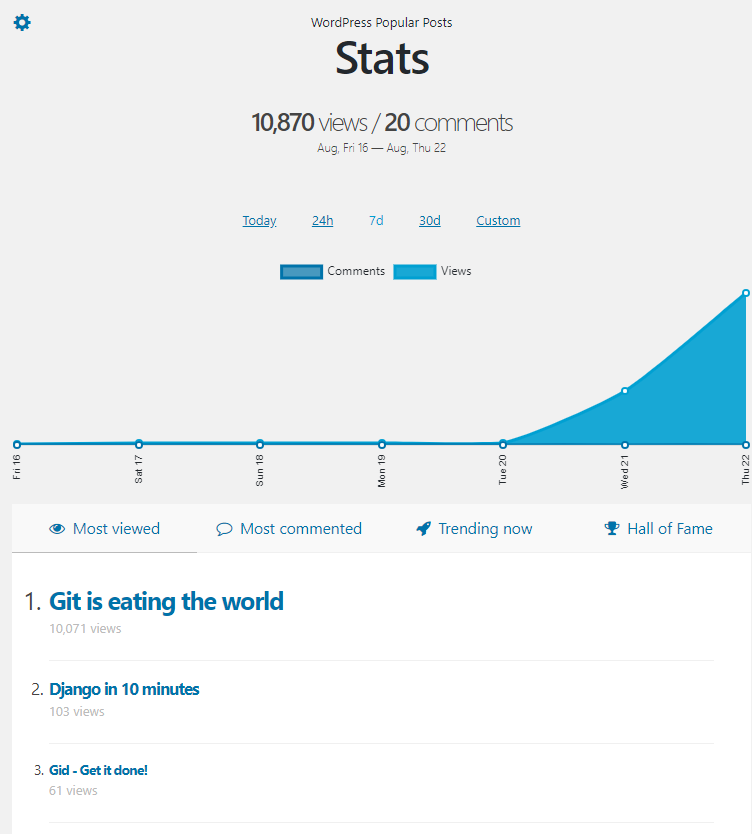Yesterday I wrote a story about how Git is eating the world. And in less than 24 hours more than 10.000 people visited this article! This is not the normal kind of traffic for this site. So that calls for its own article.

Not only did the above WordPress plugin tell me I hit 10.000, but my server logs said the same.
grep git-is-eating-the-world j11g-access.log|awk '{print $1}'|sort -u|wc -l
I run this WordPress installation on my own VPS. Which, by the way, could handle the load just fine! (PHP 7.3 is great.)

How?
I usually write about things that interest me: but those things may not always be of interest to the general public. But in this case I tried to make a conscious effort to write about something topical and a little bit controversial (BitBucket dropping Mercurial support). I also picked a catchy title: a play on Marc Andreessens’ famous quote. And I deliberately tried to push the article. I.e. this is how most content creators do it. But I usually put stuff out there, and see where it lands. I mainly enjoy writing for the sake of writing. My most visited article was a Django tutorial which generated 3000 visits this year (all from generic Google searches). So I thought I could try to give promotion a little bit more effort. This idea came after reading about a Dutch blogger who was a bit obsessed with getting clicks. Which to me is (still) not the best reason to write, but of course I can see why he was obsessed with it. When you write something, it’s more fun when people actually read it!
Submitting it
So after writing I picked lobste.rs and Hacker News to submit my story to. I submit links very frequently to both sites, just not my own content. But this content seemed right for these sites.
On Hacker News it sadly went nowhere. This sometimes happens. Timing is everything. I have often also submitted something there that went nowhere, but that same link would be on the front page the next day via a new submission from someone else. My submission did however generate 234 unique visits. Which normally would be a good day for my site.

Lobste.rs however, is a different story. Since submitting it there, it quickly shot up to the number one position. And currently (at time of writing) it was still number one. Also, lobste.rs had the most relevant discussion and comments of all aggregators.

Uh?!
After this I also tried submitting my link to Reddit. But much to my surprise someone beat me to it!? He (or she) submitted my post to two subreddits. I don’t know how the submitter found my post. But anyway, in r/programming it received exactly zero upvotes but it did generate 5 comments? But in r/coding it was the number one post for almost the entire day!
This specific subreddit has 168000 readers and around 1000 active users at any given moment. So even if it only received 83 upvotes, this did generate the bulk of my traffic.

After this, things got shared (organically?) on Twitter, and other tech sites (like Codeproject) also picked it up. People also seemed to share the link by e-mail: 175 unique clicks came from Gmail and 32 from Yahoo! Mail. Which I think is quite a lot!
I also cross post every WordPress article to Medium: these readers don’t come to my site, but they are of course able to read my content. However, the reach there was very low.

Lessons?
Stating the very obvious here, but it helps to pick a topical subject and then trying to push it on news aggregators. Also (obvious) it struck me how difficult it was to get a foot in the door — those first few upvotes. After that it gets easier, because you become more visible.
These are all obvious. But the most fun was actually discovering that the thing that you wrote took on a life of its own. And people you don’t know are sharing, reading and discussing it without your interference. I just love that. I still think that that is part of the magical aspect of the internet. People I have never met who live on the other side of the planet can instantly read and discuss what I’ve written. The internet gives everyone a voice and I love it.